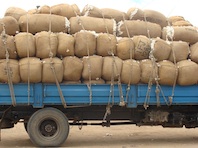AGRICULTURE: Malawian Cotton Farmers Ecstatic Over High Prices

An ardent listener to the radio, small-scale cotton farmer Mercy Kaduya from Chikhwawa in Nsanje in southern Malawi has just heard an item during the international news segment that cotton prices have hit a record high on the international market.
'I am very excited. I am looking forward to selling my cotton produce this year. I am also patting myself on the back for not giving up on the crop in 2009 when prices were bad,' Kaduya told IPS.
The International Cotton Advisory Committee (ICAC) announced at the beginning of Mar. 2011 that world cotton prices reached a new record of two dollars per pound (0.5 kg) during Feb. 2011. ICAC is a global body representing governments, which raises awareness and promotes cooperative action on issues of cotton worldwide.
ICAC indicated that although cotton prices were expected to decline from record levels, it is expected that they will remain significantly higher than the average of 60 dollar cents per pound that prevailed in the past 10 years.
The rise in prices has been attributed to a low supply of the crop; high demand; and the depreciation of the U.S. dollar.
Malawi’s economy is highly dependent on agriculture, with cotton contributing about 32 million dollars in foreign exchange earnings. The crop is the country’s fourth largest foreign exchange earner, after tobacco, sugar and tea. Tobacco contributes 60 percent of the country’s foreign revenue.
Kaduya told IPS that she suffered huge losses on the local market in 2009 when buyers offered low prices in the range of between 28 and 30 dollar cents per kg.
Buyers blamed the low prices on the global recession which caused prices to collapse on the international market.
The Malawian government also accused cotton buyers of exploiting small- holder farmers which led to a stalemate that culminated in a government ban being imposed on the sale of cotton.
'Some of my produce got destroyed right in storage in my house because I could not take it to the market on time,' said Kaduya.
'I used the little money I made in 2009 to pay back loans for the inputs and pesticides I had used in growing the crop. I considered abandoning the production of cotton.
'But then I thought, ‘let me give it one more chance’. Many farmers in my vicinity stopped growing cotton after that bad experience,' said Kaduya.
The 2010 growing season gave Kaduya and the farmers who stuck to growing cotton some hope. Minimum prices rose to 75 dollar cents per kg.
Farmers such as Kaduya are getting more and more optimistic that the prices will be even better this year once the trend on the international market filters down to the Malawian market.
Principal secretary at the ministry for agriculture Andrew Daudi told local journalists after the ICAC announcement that prices were at record high. Projections for cotton production in Malawi for 2011 are 55,000 metric tonnes, up from 29,000 metric tonnes in 2010.
'The crop attracted good prices last year because many farmers had abandoned the production of cotton in the wake of 2009’s poor prices. There was high demand and so the prices shot up,' explained Daudi.
He added that farmers who continued to grow the crop have produced more in 2011 because of the positive development with prices.
The Cotton Development Trust (CDT), which works on ensuring that there is a fair deal between farmers and buyers on the Malawi market, is also excited about the development on the international market.
CDT spokesperson Duncan Warren anticipated that there will be stiff competition during 2010 among cotton buyers and that this will be good for small-scale farmers.
'Cotton ginners have already expressed interest to buy cotton from farmers at a good price and we are optimistic that everyone involved will be happy,' said Warren.
Small-scale farmers sell raw cotton to ginners who process the cotton and sell it on to the international market.
© Inter Press Service (2011) — All Rights ReservedOriginal source: Inter Press Service
 Global Issues
Global Issues